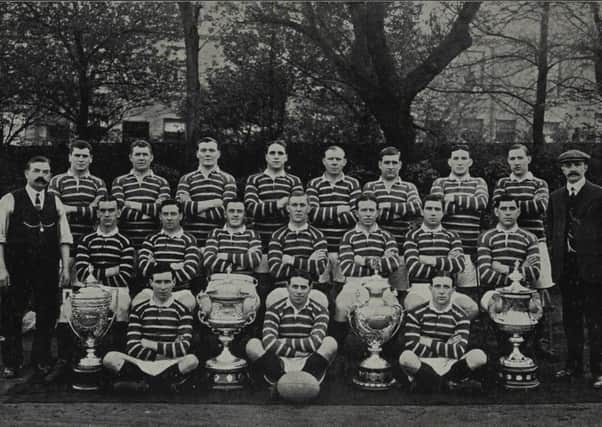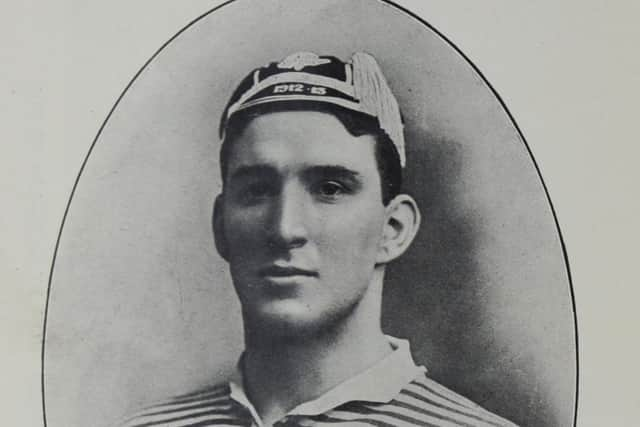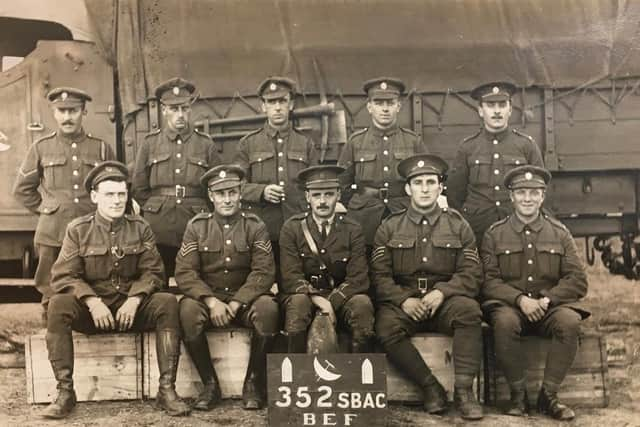World War One hero Douglas Clark proved a colossus in Huddersfield’s ‘Team of All Talents’ – Sporting Bygones


What is the story? A supremely talented and tough loose-forward who played in the legendary Huddersfield ‘Team of All Talents’ that famously won all four competitions in 1914-15, Clark was perhaps always destined for rugby league stardom especially as he also represented Great Britain with such distinction.
However, later in life, he also switched sports with stunning success, too, becoming the country’s first genuine wrestling superstar after being crowned All-in Wrestling Champion of the World.
Advertisement
Hide AdAdvertisement
Hide AdMoreover, Clark, the son of a Cumbrian coal merchant, had already won the prestigious Military Medal for heroic acts of bravery during World War 1, saving countless lives on the battlefields of Belgium.
The inspirational colossus certainly packed plenty into his fascinating life and, indeed, all pitched together, it could almost sound like the makings of a zany character in one of David Walliams’s crazy children’s novels.
Yet this is no work of fiction and, thankfully, almost 70 years after Clark’s death, author Steven Bell has managed to give the subject the attention it deserves, skilfully chronicling it all in his recently published biography ‘The Man of All Talents - The Extraordinary Life of Douglas ‘Duggy’ Clark.’
Bell, who lives in Huddersfield, had previously written one sports book based on the heart-breaking story of Brazilian football club Chapecoense, who saw the majority of their squad, coaches and staff tragically perish in a plane crash in 2016.
Advertisement
Hide AdAdvertisement
Hide Ad“I really wanted my second book to be something close to home – a local piece of sporting history that possibly hadn’t been given the focus it deserved,” he explained.


“Randomly, whilst hoping to find my next project, I stumbled across a picture on social media of the Imperial War Museum North’s display in honour of Douglas Clark.
“It piqued my interest and so I did a little research. Duggy’s achievements blew me away – and I was astonished to find out he had lived most of his life just a mile away from where I live.
“I had found my project.”
As Bell began his research into Clark, who also featured in the famous 1914 ‘Rorke’s Drift’ Test against Australia where Great Britain won despite being decimated by injury, he became increasingly staggered by the enormity of his subject’s exploits.


Advertisement
Hide AdAdvertisement
Hide AdHe said: “What makes the second part of Clark’s pioneering sporting accomplishments – both in rugby and wrestling – so remarkable is that he was discharged from the Army Service Corps during World War One because the injuries he had sustained in the Battle of Passchendaele were so severe.
“He was awarded the Military Medal for bravery as well as a 20 per cent disability certificate, and told specifically not to take part in any strenuous sporting activity ever again.
“Thankfully for fans of the old Fartown team, Great Britain and national sporting history, he decided to go against that advice…”
Clark – who courageously carried fallen soldiers on his shoulders like coal sacks while delivering ammunition to the front line – went on to play 485 times for Huddersfield, still a club record to this day.


Advertisement
Hide AdAdvertisement
Hide AdHe retired in 1929 and then proceeded to use all those physical attributes to take the wrestling world by storm.
Bell added: “What I found amazing was that when researching any one of the three major parts of his life – rugby, war or wrestling – in each one his achievements and his legacy stood alone.
“The fact one man accomplished so much in each of those three spheres across a 30-year period is really quite astonishing.
“There were even times early on in my research that I doubted it could all possibly be the same Douglas Clark!
Advertisement
Hide AdAdvertisement
Hide Ad“To knit it all together into a coherent timeline of his life was really addictive.
“I visited his niece, Elizabeth, who holds almost all of his memorabilia and personal artefacts.
“She was very supportive and helpful towards the project and I owe her many thanks.
“She couldn’t be more proud of the legacy left by her ‘Uncle Douglas’.”
What a legacy it is.
Advertisement
Hide AdAdvertisement
Hide AdBell continued: “There were competitions to make the title official, but Douglas Clark was widely regarded as the world’s strongest man.
“His superhuman power had developed as a young boy as he helped his father with his coal deliveries and trained relentlessly as a prodigy in both rugby and in the local art of Cumberland & Westmorland wrestling.
“At the time, Northern Union had not long split from the Rugby Football Union and was still developing as a sport of its own.
“Douglas could play anywhere on the pitch, but found fame as the world’s greatest old-fashioned forward.
Advertisement
Hide AdAdvertisement
Hide Ad“His speed, strength and intelligence were unparalleled and, therefore, both his defensive positioning and tackling were perfect and in possession he was able to carry the ball outrageous distances up the field, with opposition almost helpless to stop him.
“He pioneered new standards for the forward role and scored an exceptional number of tries for a man in that position.
“For Fartown, he played in the fabled ‘Team of All Talents’, alongside captain Harold Wagstaff and legendary Australian Albert Rosenfeld.
“Those three great men are all now inductees into the Rugby League Hall of Fame.
Advertisement
Hide AdAdvertisement
Hide Ad“The team won 15 major trophies in a period broken up by the Great War.
“With that 1914-15 season, they are still regarded as possibly the greatest and most ground-breaking rugby league team of all time.”
Using extracts from Clark’s war diaries and previously unreleased memoirs, along with his own illuminating detail, Bell has written a captivating tale which, unsurprisingly, was quickly sent for a reprint by Pitch Publishing soon after its release.
Away from his sporting success, the unassuming Clark was a popular character at home in his local area, living in Huddersfield before dying suddenly at the age of 59 from heart disease.
Advertisement
Hide AdAdvertisement
Hide AdBell said: “It has been wonderful to see Duggy’s story capture the hearts and minds of the country a century on from his previously forgotten heroics.
“The feedback I have had has been very humbling, especially for those who are distant relatives of Duggy, learning the true extent of the great man’s achievements.
“This will always be his story, not mine. I am just proud to be associated with it.”
Comment Guidelines
National World encourages reader discussion on our stories. User feedback, insights and back-and-forth exchanges add a rich layer of context to reporting. Please review our Community Guidelines before commenting.